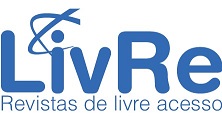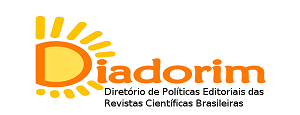ENVIRONMENTAL EPIDEMIOLOGY
PUBLICATIONS IN THE BRAZILIAN JOURNAL OF EPIDEMIOLOGY (1998-2021)
DOI:
https://doi.org/10.20873/rtg.v12i27.15605Keywords:
Environmental Health, Surveillance, Monitoring, Risk assessmentAbstract
Environmental Epidemiology analyzes how existing risks (physical, biological, mechanical, ergonomic and psychosocial) interfere with the health of human populations. This Course Completion Work aims to verify the publications on the subject in the Brazilian journal of epidemiology. This is a descriptive research, based on a review of the database of the Revista Brasileira de Epidemiologia online version ISSN 1980-5497, considering the period from 1998 to 2021. A total of 23 volumes distributed in 87 numbers or editions (87 %) and supplements (13%) were found during the period. Of a total of 1258 original articles, 258 dealt with environmental epidemiology. Considering the special articles, of the 18 published, only 1 was about environmental epidemiology. In 2003, number 2 of volume 6 was dedicated to the subject of environmental epidemiology. All 8 articles published focused on this topic. The two most frequently published topics were linked to pesticides and related to work. It is concluded that the various topics covered in the journal discuss information about the characteristics of exposure and health effects that constitute the main substrates in such epidemiological studies, suggesting the importance of environmental epidemiology to support decision-makers on the prevention of injuries in human populations via environmental surveillance.
References
ABRASCO. Comissão de Epidemiologia. Rev. Bras. Epidemiol. v. 3, n. 1-3, p. 70-93, 2000.
ABRASCO. IV Plano Diretor para o Desenvolvimento da Epidemiologia no Brasil. Rev. Bras. Epidemiol. v. 3, n. 1-3, p. 70-93, 2000.
ABRASCO. 11 Congresso Brasileiro de Epidemiologia: Epidemiologia, Democracia e Saúde. Disponível em: https://epi.org.br/trabalhos/index.php. Acesso em: 19 abr. 2021.
ALMEIDA, M. E. de. Guerra e desenvolvimento biológico: o caso da biotecnologia e da genômica na segunda metade do século XX. Rev. Bras. Epidemiol. v. 9, n. 3, p. 264-282, 2006.
AYRES, M.; AYRES Jr, M.; AYRES, D. L.; SANTOS, A. de A. S. dos. BioEstat: aplicações estatísticas nas áreas das ciências biológicas e médicas. Belém; Sociedade Civil Mamirauá: MCT-CNPq, 2007. Disponível em: < http://www.mamiraua.org.br/download/index.php?dirpath=./BioEstat%205%20Portugues&order=0>. Acesso em: 13 abr. 2021.
BARATA, R.B. Epidemiologia e saber científico. Rev. Bras. Epidemiol. v. 1, n. 1 p. 14-27, 1988.
BRAGA, A. L. F. Manual de Epidemiologia Ambiental: nível superior. Santos, SP: Editora Universitária Leopoldianum. 2015. Disponível em: < https://www.unisantos.br/wp-content/uploads/2018/05/Vigilancia-saude-ambiental-superior.pdf>. Acesso: 11 abr. 2021.
CÂMARA, V.M. de. Editorial Especial. Rev. Bras. Epidemiol. v. 6, n. 2, p. 84-86, 2003.
CUTOLO, A.A. Lutzomyia longipalpis (Diptera, Psychodidae) em Cuesta Basáltica, da bacia hidrográfica do Rio Corumbataí, Região Centro-leste do Estado de São Paulo. Rev. Bras. Epidemiol. v. 11, n. 2, p. 336-339, 2008.
DIAZ, J.O. et al. Correlações, risco, razão de chances e avaliação de testes diagnósticos. In: CAPP, E.; NIENOV, O.H. (org.) Bioestatística Quantitativa Aplicada. Porto Alegre, RS:UFRGS, 2020. p. 177-196. Disponível em:< https://www.lume.ufrgs.br/bitstream/handle/10183/213503/001117627.pdf?sequence=1&isAllowed=y>. Acesso em: 12 abr. 2021.
DONALISIO, M.R.; FREITAS, A.R.R. Chikungunya no Brasil: um desafio emergente. Rev. Bras. Epidemiol. v. 18, n. 1, p. 283-285, 2015. Disponível em: < https://www.scielo.br/pdf/rbepid/v18n1/1415-790X-rbepid-18-01-00283.pdf>. Acesso: 11 abr. 2021.
GIL, A. C. Métodos e técnicas de pesquisa social. São Paulo: Atlas, 2010.
GUIMARÃES, R.M. Implicações da epidemiologia ambiental para a tomada de decisão estratégica na gestão em saúde pública. Cad. Saúde Colet. v. 20, n. 1, p. 1-2, 2012.
HENRIQUES, C.M.P. Regulação sanitária sem fronteiras. Revista de Direito Sanitário. v. 2, n. 1. p. 113-126, 2001.
ORGANIZACIÓN MULDIAL DE LA SALUD. Epidemiologia: guia de métodos de enseñanza. Washington, DC, 1973.
REVISTA BRASILEIRA DE EPIDEMIOLOGIA. Revista on-line. Disponível em:< https://www.scielo.br/scielo.php?script=sci_serial&pid=1415-790X&lng=pt&nrm=iso>. Acesso: 11 abr. 2021.
SNOW, J. Sobre a transmissão do cólera em Londres. São Paulo: HUCITEC-ABRASCO, 1990.
WIWANITKIT, V. Medialogy diagram construction on dengue fever. Rev. Bras. Epidemiol. v. 16, n. 2, p. 555-555, 2013.
Downloads
Published
How to Cite
Issue
Section
License
Copyright (c) 2023 Tocantinense Journal of Geography

This work is licensed under a Creative Commons Attribution-NonCommercial-NoDerivatives 4.0 International License.
Revista Tocantinense de Geografia does not remunerate any author for the publication of their texts. The contents of the texts published in this journal are the responsibility of the authors.








.png)












